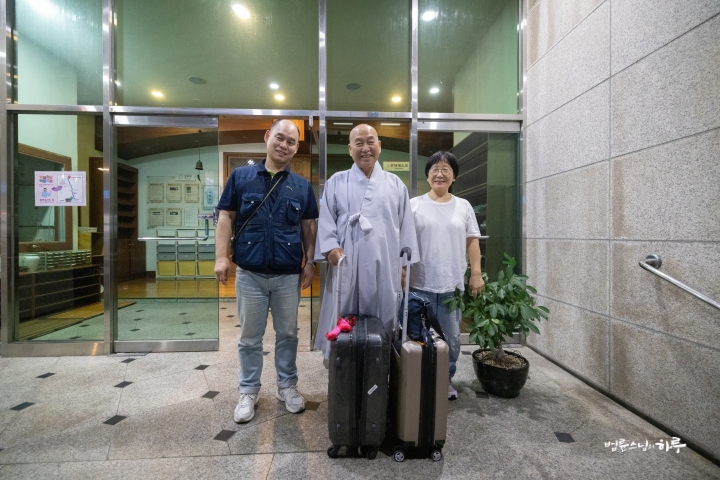Sep 4, 2025 – Arrival in Korea via Hong Kong
Hello. Today marks the return to Korea after completing a two-week lecture tour of Western North America and Oceania.
Sunim boarded a plane at Perth Airport at 12:10 AM last night and after a 7-hour and 45-minute flight, arrived at Hong Kong Airport, the transit point, at 8:00 AM.

After a simple breakfast at the airport, Sunim moved to a quiet space with a desk. Though fatigue should have been setting in, he spent time attending to work.


After waiting all morning, Sunim boarded the flight to Korea at 2:25 PM.

After approximately 4 hours of flight, the plane arrived at Incheon Airport at 7:05 PM. By the time luggage was collected and Sunim arrived at the Jungto Center, it was nearly 9:00 PM.

Staff members who came to greet him offered warm welcomes.
“Sunim, congratulations on your safe return.”
“Yes, I had a good trip.”

Sunim organized his belongings, reviewed manuscript proofs, and then retired for the night. Tomorrow, he plans to depart Seoul at 3:00 AM for Dubuk Jungto Retreat Center to work on the farm.
Since there was no Dharma talk today, I’ll conclude by sharing a dialogue between Sunim and a questioner from the Dharma Q&A held in Seattle on August 23rd.

Is Everyone’s Destiny Predetermined by Their Birth Chart?
“We have a Korean saying: ‘Your destiny depends on what you make of it.’ One’s nature rarely changes until death. That’s why we often say someone is ‘born that way.’ In India, they say it’s inherited from past lives, while in China, they believe destiny is determined by the date and time of birth. Ultimately, both mean it doesn’t change easily. In India, there’s a word called ‘Karma.’ While often translated as fate, the Buddha interpreted it as ‘that which has been formed.’ In Buddhism, this is called karmic consciousness. Simply put, it means ‘habit.’ A habit refers to behavior that has become automatic and unconscious, making it difficult to change. What we call ‘fate,’ ‘temperament,’ or ‘nature’ are actually all formed things.
For example, when we see someone struggling to quit smoking, we don’t say ‘They’ve been smoking since their past life’ or ‘They have smoking in their birth chart.’ Everyone knows it’s a formed habit. Similarly, a person’s personality, habits, and temperament are formed things, mainly developed by age three. However, once these traits are formed, they don’t change easily unless one reaches what the Bible calls the level of ‘resurrection.’ Resurrection doesn’t simply mean a person dies and comes back to life. It means being fundamentally and completely reborn. Like a complete transformation, where one’s temperament and nature change entirely, becoming like a completely different person—that’s true resurrection.
So resurrection isn’t just about the body coming back to life. Understanding it only as ‘resurrection of the flesh,’ as commonly interpreted in Christianity, is too limited. True resurrection is when a person is fundamentally reborn and no longer fears death.
Because human nature is so difficult to change, people gradually came to think that ‘fate is already predetermined.’ Indians asked, ‘Why does that person have such a temperament?’, ‘Were they born with it?’, ‘Then where did that temperament come from?’ Indian culture found the answer in ‘past lives.’ They believed the results of karma from past lives carry into the present life, where seeds grow into sprouts, bloom into flowers, bear fruit, and the fruit becomes seeds again, continuing into this life. In China, they believed that a person’s innate temperament and nature are determined by four factors: year, month, day, and hour of birth. This is the birth chart system. Though called by different names, the view that fate is determined by deities appears commonly across cultures. Christians believe God determines fate, Muslims believe it’s Allah, Chinese believe it’s the Jade Emperor, and Koreans believe it’s Hananim. Thus, traditional cultures have explained the cause of fate in three ways: ‘past lives,’ ‘birth charts,’ and ‘deities.’
However, after deep contemplation on this issue, the Buddha declared, ‘Fate is something formed, not unchangeable.’ The Buddha’s core teaching is impermanence. Nothing remains unchanged; everything is in constant flux. But that doesn’t mean things change easily. If they changed easily, we wouldn’t call them ‘temperament’ in the first place. Changing personality or habits requires consistent practice. That’s why the Buddha’s final teaching was ‘diligent practice without negligence’—’Don’t be lazy, practice diligently. Like water drops wearing away stone.’ Since habits are the result of long accumulation, changing them requires equally long and consistent practice.

There are two main factors in what has been formed. First, there are genetic factors. For example, when birds carry mud to build nests, it’s not because they learned it but because it’s an instinct encoded in their genes. Humans also have basic genetic traits, but the genetic differences between people are very small. Second, there’s something like a mental ‘app’ that has been formed. Each person has slightly different apps installed, and through these apps, they see, hear, and feel the world. What we commonly call innate nature or destiny is actually formed tendencies.
This doesn’t mean we must change all tendencies or traits. However, if certain tendencies cause significant harm, they need to be changed. For example, a quick temper can sometimes be an advantage, but if it causes serious damage, it should be corrected. Throughout history, there have been generals who endangered their countries because they couldn’t control their tempers. Improving such harmful tendencies is what practice is all about. This is the ‘path to changing destiny,’ or in Christian terms, it could be called ‘being born again.’ Though the expressions differ, practice isn’t unique to Buddhism.
If I were to hide the fact that I’m a monk and go to have my fortune told, would the fortune teller say I have blessings for children or a spouse? Probably not. That’s because fortune tellers have a certain ability to read the unconscious mind. What’s commonly called spiritual power is actually exceptional intuition. Just by hearing someone’s voice, their psychology is unconsciously transmitted. That’s why when someone visits a fortune teller after their parents have passed away, the fortune teller might say as soon as they enter, ‘Your mother has passed away!’ Ordinary people are shocked, but in fact, past events remain in the unconscious, and fortune tellers can read parts of it. However, they cannot read the future that hasn’t yet come. Instead, they only read the parts that concern us.
Skilled fortune tellers are good at predicting the past but don’t know their own destiny. The thought that ‘since they know the past, they must know the future’ is a misconception. The fortune teller probably read your outgoing nature and said things like ‘Don’t stay at home, go out!’ or ‘Don’t stay in Korea, go abroad!'”
“I’ve only been once. Now I’m trying not to go to fortune tellers anymore and trust myself instead.”
“When someone dies at a young age, we call it a short life. So did all the students who died in the Sewol ferry disaster have fortunes that predicted short lives? If we looked at their fortunes now, most might say ‘yes,’ but before the accident, that wouldn’t have been the case. For example, if I had gotten married, my fortune would surely have shown ‘a wife and children.’ But because I chose to become a monk, now it shows ‘no blessing of a wife or children.’ Some people end up doing things they swore they’d never do, but that too is their choice. If you choose marriage, your fortune shows blessings of a spouse and children; if you live alone, it shows none. Do you understand what I’m trying to say in this roundabout way?”
“Yes, thinking about it now, it was my choice, and I’m satisfied with that choice. I’ll continue to trust my choices going forward. Thank you.”
“In the past, people could only marry once and had to marry someone they’d never met or even seen. Especially for women in the past, who had almost no social activities, marriage determined their fate. So they were always curious and anxious about what kind of man they would marry in the future. Compatibility readings emerged as a safety mechanism to calm that anxiety. But nowadays, people date for years and even live together to get to know each other. In this situation, is there really a need for compatibility readings? Of course, we can’t know everything about a person, but nowadays divorce is possible after marriage, and remarriage is also an option. While compatibility readings were necessary in the past, now it’s much more accurate to meet and verify things yourself.
Even today, when parents say ‘the compatibility isn’t good,’ it’s actually when they want to oppose the marriage. If your partner keeps pushing for marriage but you’re not interested, you could use the excuse ‘our compatibility isn’t good.’ So in this era, we should respect fortune telling and compatibility readings as part of our cultural past. There’s no need to treat them as absolutes, as if destiny is predetermined or you’re fated to go abroad. That’s why I said at the beginning, ‘Your fate depends on what you make of it.'”
“Yes, Thank you.”





